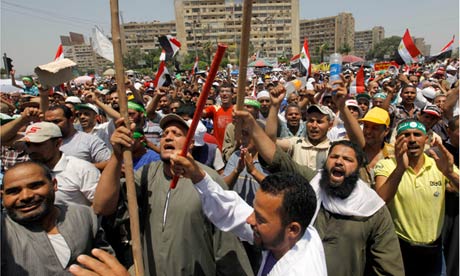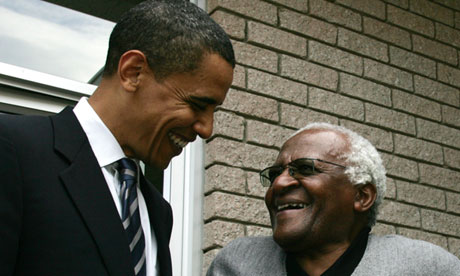© Perrine Mouterde
Millions of Egyptians have signed up to the Tamarod – or rebellion – campaign, which is calling for an early presidential election to mark President Mohammed Morsi’s first anniversary in office on June 30.
Walaa, a young demonstrator dressed in a flowing all-black cloak and veil noted that a year ago she voted for Mohamed Morsi in the first presidential election after the fall of Egyptian strongman Hosni Mubarak.
Disappointed by the government, Walaa now supports the Tamarod campaign.
Launched in early May by a group of young people – including a few members of Kefaya, one of Egypt’s oldest opposition movements – Tamarod is a signature campaign calling for an early presidential election since, the organisers claim, Morsi has lost the trust of the Egyptian people.
Over the past few weeks, the movement has spread quickly across the country.
The petition, which is available on the Internet, has been printed and photocopied by volunteers, who collect signatures at traffic intersections, markets and metro stations in Cairo and other towns and cities. Several opposition parties have also opened their premises to the campaign and have mobilised their members. Tamarod organising committees have been formed in towns and cities such as Ismailia, in eastern Egypt, and Kafr Zayat, a city 90 kilometers north of Cairo.
On the movement’s Facebook page, which at last count had nearly 400,000 fans, activists post pictures of signatories from Aswan, in southern Egypt, to Sharm El Sheikh, in the Sinai.
The organizers say they have already collected nearly 15 million signatures. That’s 2 million more than the 13 million voters who handed Morsi a slim 52% victory in the June 2012 run-off vote against Ahmed Shafiq, the last prime minister to serve under Mubarak.
‘There is no work, no security, no state’
In the Kobri el Kobba district of Cairo, Fahed Hosni, 22, fills out the Tamarod form, supplying his name, national identity card number and governorate. “Mohamed Morsi is not the right person to lead the country,” he explains. “He has not delivered on any of the demands of the revolution.”
Like many Egyptians, Habib finds daily life getting harder each day. Egyptian authorities are still awaiting a $4.8 million IMF loan, which was agreed in principle two years ago.
Negotiations for the loan have run into repeated snags, with the IMF calling for more robust reforms. With economic growth down from a pre-2011 average of 7% to around 2% after the uprising, plummeting foreign reserves, rising unemployment and inflation, Egypt’s economy has been battered and is only being kept afloat by loans from Qatar and other regional states.
Read More and Watch Video Here
***************************************************************************************************

Supporters of
President Mohamed Morsi shout anti-opposition slogans outside the Rabia
el-Adawiya Mosque in Cairo, not far from the presidential palace, on
Saturday. Photograph: Amr Nabil/AP
Egypt's fate feels as uncertain as at any point since the 2011 uprising, which toppled Hosni Mubarak, with repeated rumours of military intervention.
At least eight people have died and more than 600 have been injured in fighting between Morsi's Islamist allies – who argue that his democratic legitimacy should be respected – and his often secular opponents, who say that he has not shown respect for the wider values on which a successful democracy depends.
But with at least four attacks nationwide on offices of the Muslim Brotherhood – the Islamist group from which Morsi hails – divisions are being increasingly drawn on ideological grounds. Anger is directed not just at Morsi, but at the Brotherhood, which is considered a partner in his eventual aim of restructuring the state along more religious lines. A former Brotherhood MP was killed in fighting earlier in the week.
The US has warned its citizens to defer non-essential travel to Egypt and told non-emergency diplomatic staff to leave. Cairo's main airport was crammed on Saturday, with all international flights reportedly fully booked.
"We're here to bring down the Murshid's regime," said Saad el-Aswany, a builder from Aswan attending an anti-Morsi protest in Tahrir Square. The Murshid is the Muslim Brotherhood's leader, and members of the opposition think his office is the real power behind Morsi's throne. "Banish the Murshid and all who are with him," shouted thousands alongside him, many waving Egyptian flags.
Five miles away, hundreds of thousands were waving the same national flag – but with a different vision of what it represented. "Islam, Islam," chanted those who had descended on the capital to support their president. "Islam in spite of liberalism."
"I'm here for Islamic law first, and democracy second," said Moustapha Sabry, a maths teacher who follows the strict Salafi form of Islam.
Cairo remained relatively calm on Saturday as tens of thousands of people, both supporters and opponents of Morsi, were engaged in relatively peaceful sit-ins. But with deaths in several provincial cities, there are mounting fears over stability — especially since Morsi's opponents have promised to mobilise millions on Sundayto force him from office. Protest organisers said a petition calling on Morsi to quit had collected 22 million signatures, although the figure, which amounts to 40% of the electorate, could not be verified.
Read More Here
**************************************************************************************************
Tamarod surpasses 22 million signatures
The group proposes a six-month transitional road map

The
Tamarod campaign announced on Saturday that they had collected over 22
million signatures in their petition campaign to withdraw confidence
from President Mohamed Morsi and hold early presidential elections in a
press conference.
(Photo by Aaron T. Rose)
(Photo by Aaron T. Rose)
The Tamarod campaign announced on Saturday that they had collected over 22 million signatures in their petition campaign to withdraw confidence from President Mohamed Morsi and hold early presidential elections in a press conference.
“The president lost his legitimacy when he didn’t follow the law or the constitution and when he put the interests of his group before those of the Egyptians,” said Tamarod founding member Mohamed Abdel- Aziz .
The group proposed a six-month transitional road map where they hand power to an independent prime minister who would head a technocratic government. The head of the constitutional court would be assigned the duties of the president, but with limited powers, until holding presidential elections.
The statement added that the National Defence Council would have the authority to fulfil its national security responsibility towards the country.
Tamarod spokesperson Mahmoud Badr said that they would close all Tamarod branches and their headquarters would instead be located in the squares all over the country, adding that they would release a statement everyday at 10 pm detailing what is happening around the country.
Badr said that the 30 June protests are a continuation of the 25 January revolution. “Tamarod wouldn’t be the leader, it is the Egyptian people who will lead us,” Badr added.
Badr asked people to participate in 30 June protests saying, “The petitions without the sit-ins and protests would be useless.”
The starting points of the 30 June marches include marches in Heliopolis, Shubra, Nasr City, Ein Shams and Al-Matareya that will head to the Presidential Palace, while marches from Mostafa Mahmoud mosque, Haram and Giza will head to Tahrir Square.
Badr condemned any attempts to drag people into violence and accused the Brotherhood of using violence in the past saying that, “Egyptians wouldn’t fear their terrorism.”
Nadia Henry, a former Shura member, announced the resignation of eight members from the Shura council, stating, “We have decided to be on the people’s side from the very beginning,” she said. She added that they stood against the draft judiciary law, and supported the ministry of culture sit-in from the first day.
Read More Here
**************************************************************************************
Nine Egyptian MPs resign ahead of anti-Morsi protests

Members of the Egyptian Shura Council attend a meeting in Cairo. (file photo)
Sat Jun 29, 2013 10:17PM GMT
LAST UPDATE
Nine
secular Egyptian MPs have resigned from the acting parliament ahead of
Sunday’s demonstrations against President Mohamed Morsi.
The MPs said on Saturday that they had resigned from the Shura Council, the upper house of Egyptian bicameral parliament, in support of the Egyptian people, Ahram Online reported.
The Shura Council took over legislative duties after parliament was dissolved in June 2012 by the Supreme Council of the Armed Forces (SCAF), the country's then ruling military council.
According to Shura Council speaker Ahmed Fahmy, a number of other MPs also reigned but their resignations are yet to be accepted.
In a televised address on June 26, Morsi said the polarization of the country's political life is "threatening to paralyze” Egypt.
He acknowledged that he had made some mistakes during his first year in office but called for national reconciliation, saying that he was open to cooperating with the opposition on constitutional reform.
On June 27, Egypt's main opposition coalition -- the National Salvation Front (NSF) -- rejected the president’s offer and called instead for early elections.
The NSF claimed that Morsi had failed to take responsibility for the country's deep political polarization and failed economy.
The opposition group Tamarod (Arabic for Rebellion) has called for mass demonstrations on Sunday, which marks Morsi’s first year in office, to demand his resignation and early presidential elections.
Several political groups say the government is dominated by the Muslim Brotherhood. The opposition also accuses Morsi of deviating from the 2011 revolution that toppled the Western-backed regime of former Egyptian President Hosni Mubarak.
Morsi’s supporters, however, say the president is cleansing Egyptian institutions of corruption but he needs time to realize the ideals of the 2011 revolution.
"We gave them a chance to lead a reconciliation but they didn't. The resignation comes to support the popular trend in Egypt," said MP Mona Makram Ebeid, who resigned on Saturday.
Ihab al-Kharatt, the head of the human rights council at the Shura Council, said some 22 deputies had quit.
"We resigned in support of 22 million Egyptians who withdrew their confidence from Morsi," Kharatt stated, referring to a petition launched by the opposition group Tamarod which says it has gathered 22 million signatures to demand Morsi's ouster and a snap presidential election.
GJH/AS
Read More Here
***********************************************************************************











































